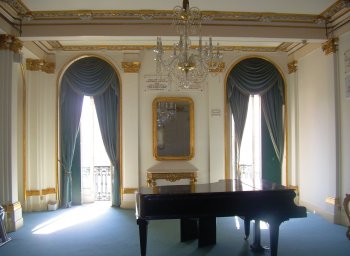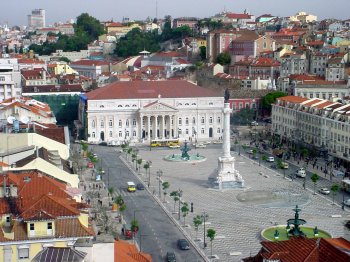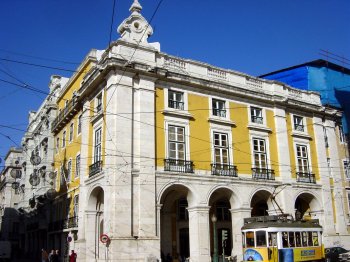Explore the best places
Monuments in Lisboa
Edifício do Teatro da Trindade
- heritage
Rua Nova da Trindade, 9
1200-301, Lisboa
The Teatro da Trindade is the most well-preserved specimen of the Italian theater in the country, with a structure practically Virgin of cement and iron, allowing you to maintain a single acoustic and stage machinery that constitutes a unique heritage in terms of theatrical archaeology in Portugal. Also has a Studio Room, sala experimental (blackbox) with 50 seats. Hall, the excellence and the nobility of a lounge suitable for chamber music recitals and poetry, small exhibitions, autograph sessions, honors and prestigious presentations.

Edifício do Teatro Nacional Dona Maria II
- heritage
Praça Dom Pedro IV
1100-201, Lisboa
Located at the Rossio north side, the Teatro Dona Maria II was built in 1840 by the Italian architect Fortunato Lodi. The façade has six columns, brought from the São Francisco Convent, and is ended with a triangular fronton where are sculpted the figures of Apollo and the Muses.

Edifício do Teatro-Éden
- heritage
Praça dos Restauradores, 9
1250-096, Lisboa
The façade, with a dynamic game of volumes, expands symmetrically to a central body. Inside are worthy of notice the décor details.

Edifício do Hotel Avenida Palace
- heritage
Rua 1º de Dezembro, 123
1250-359, Lisboa
Work of arq. J. L. Monteiro. Characteristic of a neorrenascimento end of a century, combining classicizantes with other more avant-garde aspects.

Edifício do Café Martinho da Arcada
- heritage
Praça do Comércio, 3
1100-148, Lisboa
After the earthquake, the Marquês de Pombal promoted the opening of taverns, being the Martinho da Arcada the oldest (1782). Located in one of the arcades of the Comércio Square, the interior of the café gives a close image to what might have been the outline of the establishments of that period. Nowadays, there are poetry and musical events in the café that was Fernando Pessoa’s favourite.

Edifício do Banco de Portugal
- heritage
Rua do Crucifixo, 7
1100, Lisboa
Majestic building with five floors where the Banco the Portugal works.

Casa na Rua Direita com Cruzeiro
- heritage
Rua Direita, 18-20
1600-436, Lisboa
House probably dating from the early 18TH century, with a simple longitudinal plant with two floors, showing, in the Centre, a cruise of facade composed of a base and a Latin cross, dating back to 1777. Featuring sober lines, highlighting his effort in frieze and cornice, torn by Windows.

Quinta Alegre / Quinta do Marquês do Alegrete
- heritage
Campo das Amoreiras, 93
1750-025, Lisboa
Late-Baroque and neoclassical farm, consisting of a Palace, a courtyard opposite the main façade, a flower garden and an artificial lake. This late-baroque palace presents a longitudinal rectangular plan with a two-storey facade divided by friezes.

Quinta da Fonte do Anjo
- heritage
Rua Cidade de Nova Lisboa
1800-108, Lisboa
This is a construction from the Marquês de Pombal period, integrated on a rustic complex with several rooms organized around a yard. The façade dates from 1762 and inside are preserved the ceilings, glazed tiles panelling from the XVIII century and some paintings on the walls. The chapel is covered with glazed tiles representing the life of the Holly Mary.

Casa da Quinta do Barrete / Edifício do INEM
- heritage
Estrada do Paço do Lumiar, 18
1600-545, Lisboa
House integrated in a walled pleasure farm, made up of the House with three floors and a garden in the back façade. It was probably built in the 19th century, undergoing renovations in the 20th century. The main façade presents sober lines, highlighting only a Bay window.
